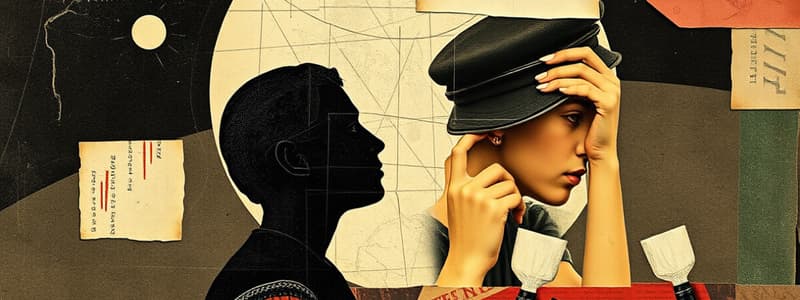Podcast
Questions and Answers
What is the main purpose of the speech given by the Big Bad Wolf?
What is the main purpose of the speech given by the Big Bad Wolf?
- To entertain the audience with a story
- To persuade the audience to see wolves differently (correct)
- To confess to his wrongdoings towards the pigs
- To explain the history of wolves in fairy tales
What lesson does the Big Bad Wolf suggest the three little pigs learned?
What lesson does the Big Bad Wolf suggest the three little pigs learned?
- That wolves are inherently bad
- To refrain from interacting with wolves
- The importance of building strong houses (correct)
- To always trust the Big Bad Wolf
How does the Big Bad Wolf react to the public's perception of him?
How does the Big Bad Wolf react to the public's perception of him?
- He is indifferent and does not care.
- He embraces the title of Big Bad Wolf.
- He agrees with their views about wolves.
- He feels hurt by the negative portrayal. (correct)
What does the wolf want the audience to feel in the introduction?
What does the wolf want the audience to feel in the introduction?
What does the Big Bad Wolf assert about the incident with Little Red Riding Hood?
What does the Big Bad Wolf assert about the incident with Little Red Riding Hood?
How does the wolf describe his intentions when he offered to escort the girl?
How does the wolf describe his intentions when he offered to escort the girl?
According to the Big Bad Wolf, what could have been a consequence if he hadn't blown down the pigs' houses?
According to the Big Bad Wolf, what could have been a consequence if he hadn't blown down the pigs' houses?
Where was grandma when the wolf arrived at the house?
Where was grandma when the wolf arrived at the house?
What is the wolf's perspective on how humans perceive him?
What is the wolf's perspective on how humans perceive him?
What emotion does the wolf express when he mentions being attacked by the woodcutter?
What emotion does the wolf express when he mentions being attacked by the woodcutter?
Flashcards are hidden until you start studying
Study Notes
Introduction and Purpose
- The wolf aims to change perceptions, presenting himself as misunderstood and advocating for his kind.
- Emphasizes the negative stereotypes associated with wolves, particularly being labeled as "Big Bad Wolves."
View of the Three Little Pigs
- The wolf critiques the pigs for their poor choice of building materials (straw and sticks) and uses this as an argument against their innocence.
- Acknowledges blowing down their houses but frames it as a lesson in safe construction rather than malicious intent.
- Claims that if he hadn’t acted, nature would have inevitably caused destruction to their flimsy homes.
Little Red Riding Hood Incident
- The wolf portrays himself as helpful, stating he tried to escort Little Red Riding Hood and protect her from danger.
- He expresses frustration about being misrepresented as the villain, asserting that he simply took a nap while waiting for Red.
- Asserts that the real misunderstanding stemmed from Red's inattention while picking flowers, and that her grandmother was safe elsewhere.
Emotional Tone
- The wolf explicitly shows anger, especially when discussing Red Riding Hood and the accusations made against him.
- Uses phrases like "this one makes me a teensy bit angry" to convey genuine frustration over poor treatment and judgment.
Conclusion
- Reiterates his plea for understanding and asks for an end to the "Big Bad Wolf" stereotype, akin to the call made at the beginning.
- The overall message emphasizes a desire for peace and recognition of the truth behind his actions.
Language and Style
- Employs conversational and relatable language, aiming to connect with the audience on an emotional level.
- Use of rhetorical questions and reasonable arguments to challenge the audience’s preconceived notions.
- Incorporates humor and sarcasm, making his monologue engaging while deepening the wolf's character.
Important Definitions
- Flimsy: describes something weak or not strong enough, used here to criticize the pigs' house materials.
- Vandal: refers to someone who deliberately destroys property, which the wolf argues is an inaccurate label for his actions.
Studying That Suits You
Use AI to generate personalized quizzes and flashcards to suit your learning preferences.




